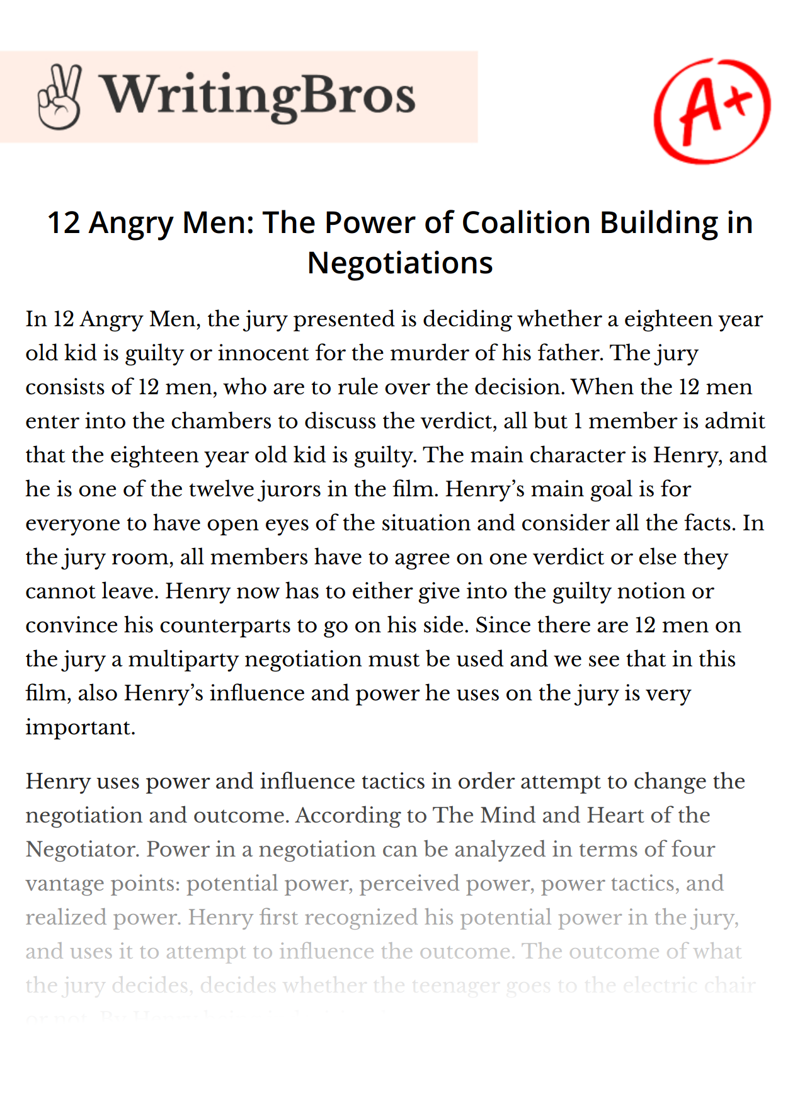12 Angry Men: The Power of Coalition Building in Negotiations

In 12 Angry Men, the jury presented is deciding whether a eighteen year old kid is guilty or innocent for the murder of his father. The jury consists of 12 men, who are to rule over the decision. When the 12 men enter into the chambers to discuss the verdict, all but 1 member is admit that the eighteen year old kid is guilty. The main character is Henry, and he is one of the twelve jurors in the film. Henry’s main goal is for everyone to have open eyes of the situation and consider all the facts. In the jury room, all members have to agree on one verdict or else they cannot leave. Henry now has to either give into the guilty notion or convince his counterparts to go on his side. Since there are 12 men on the jury a multiparty negotiation must be used and we see that in this film, also Henry’s influence and power he uses on the jury is very important.
Henry uses power and influence tactics in order attempt to change the negotiation and outcome. According to The Mind and Heart of the Negotiator. Power in a negotiation can be analyzed in terms of four vantage points: potential power, perceived power, power tactics, and realized power. Henry first recognized his potential power in the jury, and uses it to attempt to influence the outcome. The outcome of what the jury decides, decides whether the teenager goes to the electric chair or not. By Henry being indecisive, he can use power tactics and his perceived power to influence the other jurors. He can invoke discuss among the members to get them to agree with him. Perceived power is an analysis of each counterparties potential power. With perceived power, like any negotiation, each party has an equal amount of power when it starts. As it occurs in 12 Angry Men, each juror has an equal vote for the fate of the teenager.
Henry analyzed the power of everyone and saw that he had the possibility of more power. In the film, when Henry first votes not guilty, Jack is annoyed because he was tickets to a baseball game and Ed believes people from slum backgrounds are crazy. This game Henry an idea of what he was up against. The other men didn’t look deep into the facts, the already made their decision based on their own schedules or ideals. Power Tactics, comprise what’s commonly studied in negotiation behavior and refer to the behaviors designed to use or change the power relationship. With Henry’s differing opinion, he can use certain power tactics to alter the others. Lastly, realized power is the extent to which negotiators claim benefits from an interaction. Henry has the ability to claim this if he convinces others of his opinions. If the three power tactics are used with a strong BATNA, Role power and psychological power especially during a multi-party negotiation, it can reem great benefits and improve your negotiated outcomes.
According to The Mind and Heart of the Negotiation A multiparty negotiation is a group of three or more individuals, each representing his or her own interests, attempting to resolve perceived differences of interest. Multiparty negotiations have many different challenges including dividing resources, coalitions, voting and majority rule. In any multiparty negotiation, the group coming together to make a mutual agree is very difficult. Everyone in a multiparty negotiation comes from different circumstances. That is what makes these kinds of negotiations difficult. Everyone has their own ideals, opinions, and backgrounds. Coming together and going beyond that can be hard. All of the 12 men and their different backgrounds influences the outcome of the trial. In a multiparty negotiation it is important to know who will be at the table, brainstorm opinions, develop and assign process roles and to stay at the table. Henry encourages the group to stay at the table and discuss the facts. Facts such as, the unique knife that was used to kill his father. That detail was discussed in great detail. This started to make other members of the jury to gain small support for the not guilty verdict.
Henry uses power tactics to influence the other members, and one of the ways he does this is by trying to build a collation. Per “Accountability and Coalitions: Evidence from a Negotiation Experiment” a coalition is Coalitions are “a collection of parties within a larger social setting who work together to pursue mutually desirable goals” Coalition can be a very persuasive tool in a multiparty negotiation but have three main challenges: The formation and size optimization of the coalition, Trust formation and maintenance in coalitions and The complex distribution of resources among members. With those challenges come ways to overcome them. We see Henry do this. To overcome the challenges in a coalition it is important to seek verbal commitments and use unbiased-appearing rationale to divide the pie. In the film, when Henry brings up the murder weapon and sparks a conversation about that, his beliefs start to surround other members of the jury. Another vote was held, this time it was a secret ballot. Henry was not going to vote, and whatever the group decided was going to happen. When the votes were tallied up, someone else had voted not guilty now, and now slowly but surely a coalition is being built.
Cite this Essay
To export a reference to this article please select a referencing style below

